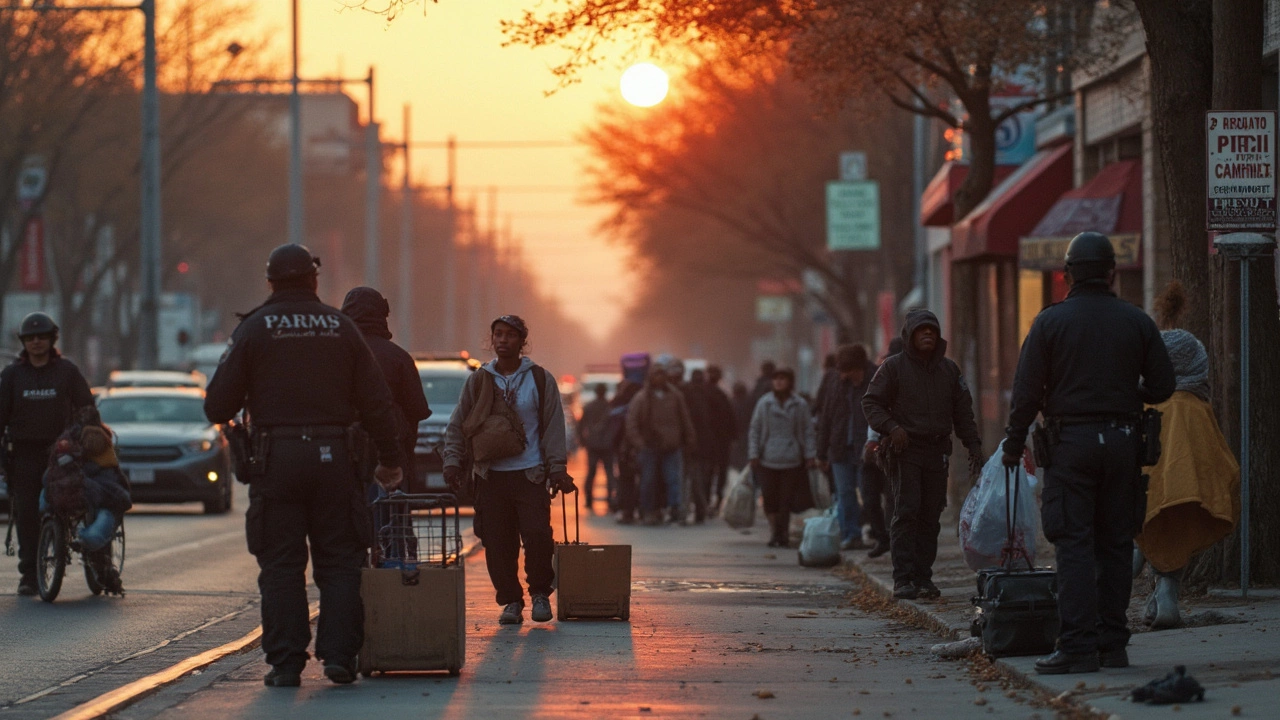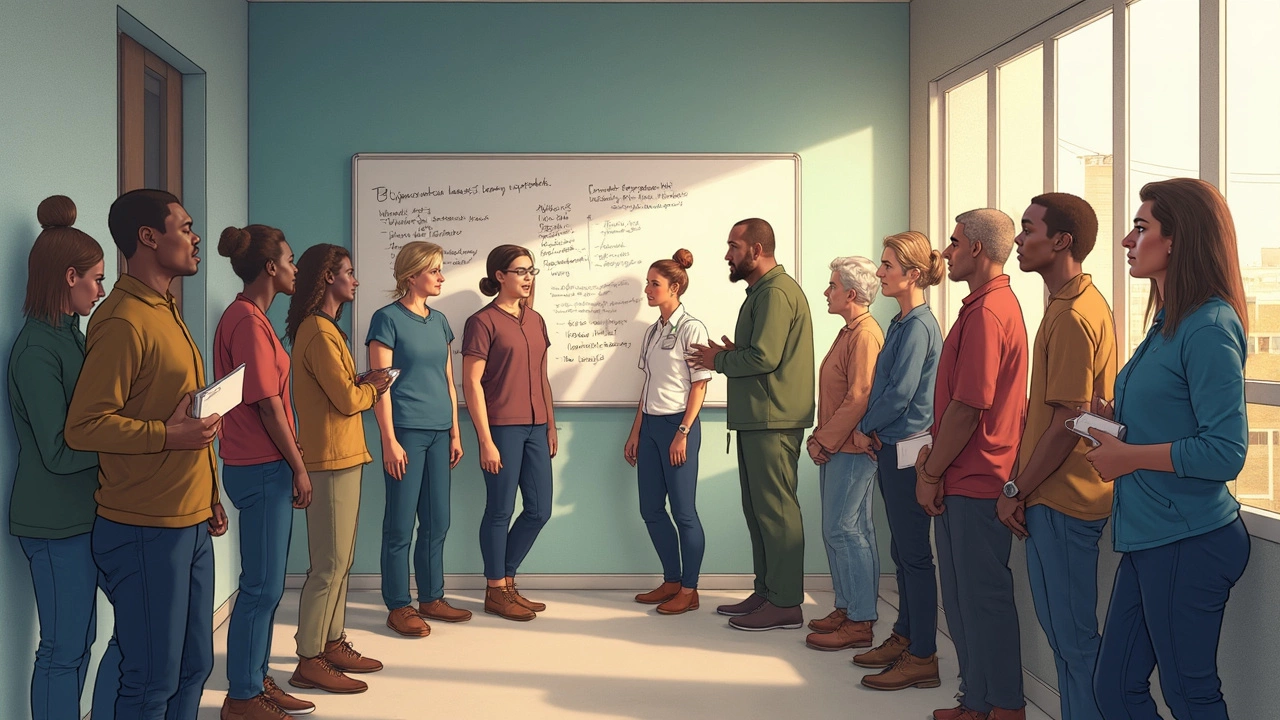Texas has brought in new laws affecting homeless people and the way shelters operate. This article breaks down the most recent rules, explains what people living on the streets need to know, and sheds light on how shelters are responding. Readers will learn about bans on public camping, ID policies, and fines, plus how shelters are adjusting services to match legal changes. Practical tips help anyone looking to understand, navigate, or help with the new legal landscape.

- Created by: Lydia Carmichael
- Completed on: 1 May 2025
- Categories: Homeless Support
Sleeping outside in Texas just got a lot more complicated. The latest laws, especially House Bill 1925, make camping in public places—including sidewalks, under overpasses, or city parks—illegal in most cities now. Police have started giving more warnings, tickets, and even arrests if someone refuses to move. City governments got pulled into the mix, too, with rules saying they can’t just ignore people setting up tents or sleeping bags downtown.
If you’re working at a shelter or visiting one, you’ll see some changes there too. Shelters are now under pressure to keep full records and stick to stricter ID checks, all because of statewide efforts to track who’s getting help and who’s returning to the street. Some shelters now require ID for entry, while others can offer temporary help even if someone doesn’t have paperwork on hand. There’s a patchwork of rules depending on where you are—Dallas, Houston, and Austin each have their own version of how much flexibility they’re giving to shelters and those seeking a bed.
- What’s Changed with Public Camping Bans?
- How Are Shelters Responding and Adapting?
- What Do These Laws Mean Day-to-Day?
- Tips for Navigating the New System
What’s Changed with Public Camping Bans?
Big shifts started in 2021 with Texas House Bill 1925. This law makes it illegal to camp outside in public places. It’s aimed at stopping tents, makeshift shelters, or even sleeping bags popping up along streets or under bridges. Now, anyone caught setting up in public without city approval can get ticketed or arrested. The law pushes towns to enforce these rules and blocks them from creating their own relaxed camping zones in most areas.
Before HB 1925, some cities like Austin had softened their rules, letting people camp on sidewalks or in parks if there was nowhere else to go. That changed two years ago when the state stepped in, saying Texas homeless laws should be tougher and more consistent. If someone refuses to move after being told by police, it's now a Class C misdemeanor—basically a ticket, but it can still land folks in jail if unpaid. Fines often run up to $500. Second or third tickets add up fast and can leave someone with a criminal record, making it way harder to ever get work or housing.
Some cities still try to work in options for folks who need shelter. Houston, for example, usually gives warnings first and points people to local homeless shelters unless there’s trouble. In Dallas, encampment sweeps happen regularly, and staff from outreach teams sometimes go along to suggest shelter before the police clear a site. Each city’s approach can be a little different, but the statewide rule is clear—camping in public is out, unless there’s a special, city-approved site, which is rare.
Here’s a quick look at how enforcement usually works since the new law:
- Police first give a warning and offer info on available homeless shelters.
- If someone refuses to move, police can issue a ticket—sometimes multiple tickets over time.
- If tickets pile up or folks keep coming back, they can end up arrested.
- Some cities hire outreach teams so people have a shot at shelter or help before facing fines.
| City | Warnings Before Fines/Arrests | Misdemeanor Fine |
|---|---|---|
| Austin | Yes | Up to $500 |
| Dallas | Yes | Up to $500 |
| Houston | Yes, often paired with outreach | Up to $500 |
Now, with statewide street camping laws taking over, the hope is that more people use shelters or get connected to services. But the reality is, if no shelter beds are free, folks can be shuffled to another corner, or just rack up more tickets. It makes knowing your rights, and which shelters have beds, way more important than ever.
How Are Shelters Responding and Adapting?
Homeless shelters across Texas aren’t just sitting back while the new Texas homeless laws shift the landscape. They’re scrambling to keep up. The top thing you’ll notice: stricter checks when people walk in the door. Most bigger cities—Houston, Dallas, and Austin for sure—have started requiring a photo ID before someone can get a bed, because of tighter shelter regulations tied to state funding. Some shelters let people stay for a few nights while they figure out ID paperwork, but steady help often needs a real ID card these days.
More folks are landing at shelters because police are clearing out the camps. In Houston, shelter occupancy shot up by nearly 15% since the new law kicked in. That means beds fill fast, lines are longer, and nobody knows if they’ll get a spot by nightfall. Staff are running more background checks and helping people apply for state IDs on the spot. Smaller shelters with fewer resources are getting creative—some now work with local libraries to set up mobile help stations for IDs and paperwork.
Shelters also started to tighten up their case tracking. The state wants data on who’s coming in, how long they stay, and who’s leaving for permanent housing. So, there are more forms to fill out and more one-on-one meetings with staff. This helps keep their funding and makes it easier for clients to move into programs like rapid rehousing.
Here’s what’s popped up in shelters lately:
- ID assistance booths at intake, often run by volunteers or legal aid groups
- Longer intake hours, because outreach teams bring in people who are newly displaced
- Extra rules about curfews and personal belongings, aiming to make things smoother with higher populations
- Health screenings, especially as shelters pack in more people after camp sweeps
Lots of folks worry that these changes will push people away. Some advocates in Dallas and San Antonio have shared that more unsheltered people are showing up in neighborhoods farther from downtown, trying to avoid street camping laws and shelter rules. If you’re looking to get help or help someone else, be prepared for longer wait times, more paperwork, and lots of questions at intake.
| City | ID Required? | Avg. Occupancy April 2025 |
|---|---|---|
| Houston | Yes | 96% |
| Austin | Yes (exceptions possible) | 98% |
| Dallas | Yes | 99% |
So, if you’re working with a shelter or planning to stay at one, expect a full house and a little more red tape than before. The goal is to get more people off the street and into supportive housing, but the road there is a lot busier and more complicated under the new laws.

What Do These Laws Mean Day-to-Day?
If you’re experiencing homelessness in Texas right now, these Texas homeless laws have real, on-the-ground impacts you’ll feel every day. The law against public camping means you can’t sleep in parks, under highways, or on sidewalks without risking a citation or worse. Police might ask you to move and, if you can’t, they can issue a ticket or arrest you—especially in cities enforcing House Bill 1925 aggressively.
If you have belongings, you may be asked to pack everything up quickly. Items left unattended for too long could be taken. In big cities like Austin, police ticketed hundreds of people last year for sleeping outside, even during freezing conditions. Fines for breaking the camping ban can go as high as $500, which adds up fast for folks barely scraping by. Some cities have begun keeping data on citations and arrests to monitor trends:
| City | Citations Issued (2024) | Arrests Made (2024) |
|---|---|---|
| Austin | 570 | 62 |
| Dallas | 390 | 48 |
| Houston | 420 | 51 |
Shelters have changed up their rules too. Now, getting a spot might require showing some ID, following new sign-in steps, or sticking to a curfew. If you don’t have paperwork, some shelters offer help getting an ID, but this might take several days. And because cities want accurate headcounts, you may have to answer more questions on check-in forms.
For anyone trying to stay safe or keep a low profile, this new system can feel like being constantly watched or hurried along. If you’re moving from place to place, it’s smart to keep your belongings ready to go and know the closest shelter’s entry times and rules.
- Check shelter policies ahead of time—they can change day by day.
- Keep ID or important paperwork protected in a waterproof bag if you have it.
- If you’re ticketed, ask about local legal aid groups. Some offer free help dealing with citations.
- Remember, the rules might shift if there’s bad weather—during freezing nights or big storms, enforcement sometimes gets relaxed and extra shelter spots open up.
The bottom line: these Texas homeless laws control where you can sleep, how you can store your stuff, and how you get into shelters. It helps to stay informed and plan ahead whenever possible.
Tips for Navigating the New System
Dealing with the new Texas homeless laws takes a little know-how, whether you’re living on the street or working at a homeless shelter. Here’s how you can avoid trouble and get the help you need.
- Know your rights about public camping. In most places, cops now have to give you a warning and a chance to move before they write a ticket or make an arrest. Austin, Houston, and Dallas have slightly different ways of enforcing things, so it might help to learn what your city’s policy is called (try searching “[Your City] camping ban policy”).
- Have an ID if possible. Lots of shelters in Texas are asking for some sort of photo ID before letting folks in. Lost your ID? Places like the Austin Resource Center for the Homeless (ARCH), The Bridge in Dallas, or Star of Hope in Houston can help start the process to get new papers. Ask a case worker—they know the fastest local options. A paper copy or even a photo on your phone sometimes works in a pinch.
- Track shelter availability before showing up. Shelter space fills up fast, especially after new laws push folks away from the streets. Some cities keep real-time info on spots through hotlines or shelter websites. In Houston, for example, you can call the Coalition for the Homeless helpline (713-739-7514) to check bed status. Using these updates keeps you from getting stuck outside all night.
- Learn the main rules before you enter any shelter. Each place is different. Some allow backpacks and pets, others don’t. Most don’t have much room, so traveling light helps. Staying on good terms with shelter staff also makes it easier to get help with jobs or housing programs down the line.
- Connect with free legal help if you get a ticket. The new camping bans come with real consequences—up to a $500 fine, which isn’t realistic for most people. Legal Aid groups like Texas Law Help or city homeless outreach teams can sometimes get tickets reduced or dismissed, especially for first-time offenders.
Check out this quick comparison of shelter ID rules in major Texas cities:
| City | ID Required for Entry? | Replacement Help On-site? |
|---|---|---|
| Austin | Usually | Yes (ARCH) |
| Dallas | Yes | Yes (The Bridge, some churches) |
| Houston | Yes but flexible | Yes (Star of Hope) |
The bottom line? Keep up with changes—laws, policies, and shelter spots aren’t set in stone. Ask outreach teams and case workers about new programs or city-specific info. The more you keep in the loop, the smoother you’ll get around the new system.
Finding yourself without a place to stay can be daunting, but knowing where to find help makes all the difference. From traditional shelters to unique options like micro-housing, we've gathered key insights to guide you. Discover practical tips and surprising facts about safe places that offer not just room and board, but also support and resources. Equip yourself with knowledge that could be lifesaving in challenging times.
Discover the most requested items by people experiencing homelessness and why they matter. From hygiene products to socks, these necessities make a significant impact. Learn how you can help and make thoughtful contributions that truly benefit those in need.

